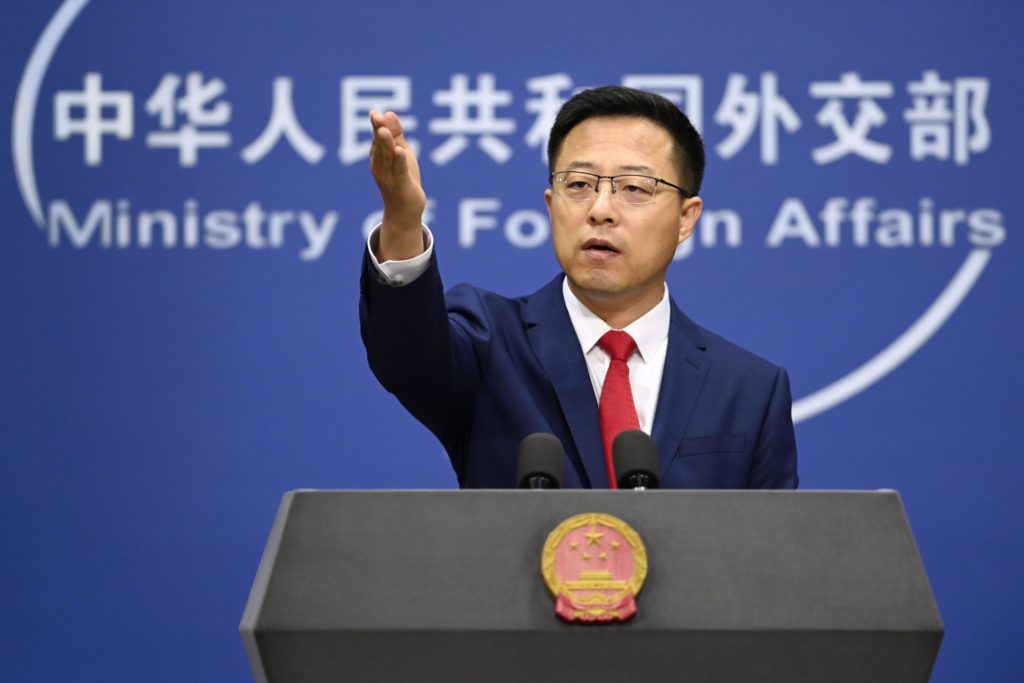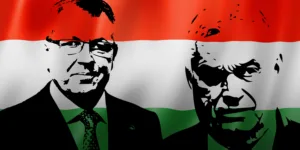Chinese media echo the Russian version of events in Bucha while blaming the West for the continued conflict in Ukraine. Whereas most Chinese netizens have no problem believing it, voices of support for Ukraine and calls for punishment of the aggressors are not unheard of either. They are, however, often met with criticism from fellow social media users influenced by the anti-Western rhetoric that has been constantly present in China.
The images of killed civilians lying on the streets of Bucha, a suburb of Kyiv, that emerged after Russian soldiers’ withdrawal from the town drew international condemnation over the last week. While Moscow immediately denied any involvement and claimed the images showed “fake dead bodies,” “staged” after its troops had left the area, the Ukrainian President Volodymyr Zelenskyy urged full accountability for Russian actions on Ukraine’s territory upon his visit to the devastated Bucha. China, avoiding condemnation of the Russian invasion of Ukraine since the beginning of the conflict, has described the gruesome scene from the town as “deeply disturbing” but again remained silent when it comes to explicitly directed criticism. Instead, the Foreign Ministry spokesperson Zhao Lijian stressed that “Humanitarian issues should not be politicized“ and “unfounded accusations” should be avoided “before a conclusion of the investigation is drawn.”
A Western ploy
The narratives concerning the atrocities in Bucha put forward by Russia have unsurprisingly been quickly echoed by Chinese state-run media. CCTV has repeated the official reaction to the incident delivered by the Ministry of Foreign Affairs, emphasizing that “any allegations should be based on facts” and not elaborating on it further. Nevertheless, in several short reports touching upon the massacre, People’s Daily (Renmin Ribao) either quotes Russian officials or refers to reports by Russian media that frame the “fabricated” images from the Ukrainian town as an attempt to “obstruct the Russia-Ukraine negotiation.” Another much detailed report highlights that “unclarified facts” revolve around the incident and influence the response of the West which has “launched a diplomatic war against Russia” and consequently “added uncertainty to the ongoing Russia-Ukraine negotiations.”
The emphasis put on the Russian rebuttal of the accusations is difficult to miss in Chinese media. Besides, the Russian side of the story is presented as credible as the report reads that “some evidence” has been shown at the UN, including a video dated earlier that shows “no dead people on the streets.” The Chinese state media criticize the West’s strong condemnation of Russia as too quick and careless, given that the “truth has not been uncovered.” Mentions of the investigation conducted by The New York Times journalists that rebuts claims by Russia can be found only in one relevant article on Guancha, a private online media portal, that also debunks misinformation about the “smoking Ukrainians among body bags” that has been widely shared on the Chinese internet, suggesting that the scene in Bucha was staged by “actors hired by the Ukrainian government” (乌克兰政府找的这位扮演尸体得演员) and “hyped” (炒作) by the US.
Speculations about the culprit
Consistent with the Chinese framing of the conflict since its beginning, the US appears to be getting more spotlight as the “initiator of the Ukraine crisis” (乌克兰危机的始作俑者) in the Chinese media than the Russian aggressors. The editorial of the nationalist CCP-backed tabloid Global Times, published in Chinese and English, focuses on the “irresponsibility” of the West that supplies Ukraine with military gear and warns against misuse of the Bucha massacre as a tool for “public opinion warfare” by the Western media. Again, Russian denials are given credence in the report. Although violence against civilians is viewed as “absolutely unacceptable” (绝对不可接受), the author diverts attention from Russia and shifts the blame to the US which is portrayed as “constantly pushing up conflicts to extract geostrategic interests.” In other words, according to the outlet, it is the US that “eventually triggers a larger humanitarian tragedy.” The US war in Afghanistan is pointed out as an example of numerous crimes committed by the American soldiers with which the author aims to demonstrate the “profound double standard” of the West. Eventually, Global Times sums the situation up feebly noting that “no matter how the Bucha incident happened, one thing is clear, that is, the war itself is the culprit of the humanitarian disaster,” pointing to China being the responsible actor in the crisis by calling for the end of hostilities (while doing nothing proactive to achieve the goal).
A thesis that the Bucha massacre has become a weapon of the West for influencing public opinion has been shared by other Chinese media that refer to the original Global Times piece. On the content aggregator Sohu, a number of articles on Bucha by the Chinese version of the Global Times can be found. One of them reads that “the ‘Bucha incident’ has become a public opinion weapon used by the West to put pressure on ‘neutral’ countries such as India” and claims that Western media use what happened in Bucha to “hype up the headlines.” Another article features statements by unnamed international relations experts saying that the incident has been used by Ukraine with the objective to “gain more international support,” while simultaneously expressing doubts that it would fundamentally affect the negotiations between Russia and Ukraine. The latest article by Global Times and its reprints go as far as openly declaring that “the people in Bucha were killed by Ukrainian soldiers” (布恰民众是被乌克兰军队杀害) in the headline, quoting Scott Ritter, a “foreign expert” whose remarks on Ukraine have been referenced by both Chinese and Russian media. Many Chinese netizens seem to be willing to believe this version of the events: “I believe this is the truth. After all, the US and the UK did not wait for the investigation outcomes before imposing sanctions on Russia, and neither did the EU – it is clear there are ulterior motives behind this” (美英欧盟不等事情调查清楚就立马制裁俄罗斯不正说明了心中有鬼吗), claims one of the comments below the article.
Divided netizens
Plenty of comments blaming the West can be seen in the comment sections. “It is evident that European countries and the US have malicious intents” (欧美国家,狼子野心,可见一斑), says one user and another believes that “the objective of the West is to impose sanctions [on Russia] but this time the excuse is way too fake” (欧美其他目的就是制裁,这次借口太假).
However, the acceptance of the Russian version of the events is by no means uniform, even despite the censorship. For example, the video of the aftermath of the Russian withdrawal from Bucha posted by the Embassy of Ukraine in Beijing was met with overwhelmingly positive reactions from Chinese netizens, many of them calling for “severe punishment of the aggressors” (严惩丧尽天良的侵略者). Some even openly expressed their support for Ukraine, taking “its side” (站乌克兰一边), and condemned the atrocities committed by Russia as genocide.
The coverage of the killings in Bucha in Chinese media once again manifests not only China’s willingness to provide political cover for its partner but also the ever-heightening anti-Western sentiment that has been encouraged for a long time by the ruling Communist Party. The high level of acceptance of narratives promoted by the Kremlin is linked to the preconceived notions that primarily see the West as the instigator of all wars and as the party that cannot be trusted, as it is ready to baselessly accuse Russia just as it has done with China many times before. China naturally aims to sustain friendly relations with Russia and is by no means willing to act in a way that could somehow aid the West. By claiming impartiality and echoing pro-Russian narratives, it shields itself from the moral obligation to act against Moscow and thus from any inconvenience that might result from it.






